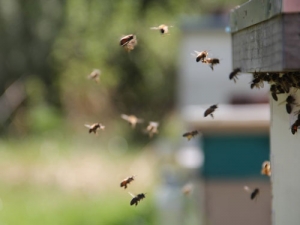Naki unveils the world’s most expensive manuka honey
Naki Honey, a New Zealand manuka apiary company, has crafted what is believed to be the world's most expensive honey.
 Hill country landowners are being prompted to act now to get their hands on high performance manuka seedlings.
Hill country landowners are being prompted to act now to get their hands on high performance manuka seedlings.
Hill country landowners are being prompted to act now to get their hands on high performance manuka seedlings.
The seedlings could see them reaping the benefits of what is expected to be a $1.2 billion industry by 2028.
Manuka Research Partnership Ltd (MRPL), has its sights on increasing the supply of highly sought after medical-grade manuka honey to significantly lift the value of the industry.
MRPL wants to lift the value of New Zealand's manuka honey industry from an estimated $242 million last year towards a target of $1.2 billion annually by 2028.
MRPL has launched a commercial arm, Manuka Farming NZ, to provide a full package of services to landowners interested in establishing a manuka plantation to diversify their businesses and at the same time protect erosion prone land.
Manuka Farming NZ's newly appointed commercial manager Allan McPherson says the latest high performance seedlings are now able to be ordered for planting in 2017. These plants will enable economically viable honey production as early as 2020.
"We had high demand for our first release of seedlings and we're confident that our second release will also be highly sought after."
Landowners interested in establishing manuka plantations to help address erosion issues are able to apply for funding through the Ministry for Primary Industries' Afforestation Grant Scheme (AGS). Applications open in April 2016 for planting in winter 2017.
McPherson says Manuka Farming NZ is set to quickly become the preeminent supplier of genetically improved manuka cultivars that have been extensively field tested and matched to individual sites. Manuka Farming NZ will also provide access to services for land environment planning, site appraisal, planting and husbandry, and be able to introduce landowners to apiarist partners and assist with funding applications.
"Our collective knowledge places us at the forefront of the science and practical knowhow regarding the successful establishment of manuka plantations and integrated apiary requirements.
"It's important that we provide a full range of services and support for landowners that are interested in this fast growing industry. MRPL has invested significantly in the science of growing manuka and we have got cultivars that will suit a wide range of climate and environment situations throughout New Zealand.
"We can match a proven cultivar to the land and environment and we can back that up with a range of support services right through the production cycle."
McPherson says more than 1000 ha of trial sites throughout New Zealand have been testing a range of manuka varieties, with 400ha being more closely monitored to gather knowledge of the plants' performance in different environments. This includes establishment, growth, nectar production and quality, floral traits and apiary performance.
"We are talking with landowners throughout New Zealand and advising them on the many benefits of planting manuka. It's not just about providing an additional revenue stream but also minimising the risk of erosion and keeping sediment out of waterways. It's a win-win," he says.
McPherson will be promoting manuka plantations at the Central District Field Days in Fielding on March 17-19 and the National Fieldays at Mystery Creek on June 15-18. The company has also launched a website www.manukafarmingnz.co.nz .
MRPL chairman Neil Walker says back country land provides the ideal conditions for growing manuka.
"We're looking at back country land and suggesting to owners to plant proven manuka cultivars backed by really good advice.
"There is a lot of steep and fairly inaccessible land out there that, if used for plantation manuka, could prevent slips and erosion. The poorer producing parts of a hill country farm can actually cost money to farm, and we can change that."
The Meat Industry Association of New Zealand (MIA) today announced that Chief Executive Officer Sirma Karapeeva has resigned from the role.
The winners of the 2026 Hawke’s Bay/Wairarapa Dairy Industry Awards were announced at the annual awards dinner held at Copthorne Solway Park in Masterton on Thursday evening.
Environment Southland is welcoming this week’s decision by the Environmental Protection Authority (EPA) to approve the release of Blaptea elguetai, a leaf‑feeding beetle that will help control the highly invasive Chilean flame creeper.
This March, the potato industry is proudly celebrating International Women’s Day on 8 March alongside the International Year of the Woman Farmer, recognising the vital role women play across every part of the sector — from paddocks and packhouses to research, leadership, and innovation.
Fruit trader Seeka posted a record profit and returns to shareholders in 2025.
Recent weather events in the Bay of Plenty, Gisborne/Tairawhiti, and Canterbury have been declared a medium-scale adverse event.

OPINION: A mate of yours truly reckons rural Manawatu families are the latest to suffer under what he calls the…
OPINION: If old Winston Peters thinks building trade relations with new nations, such as India, isn't a necessary investment in…